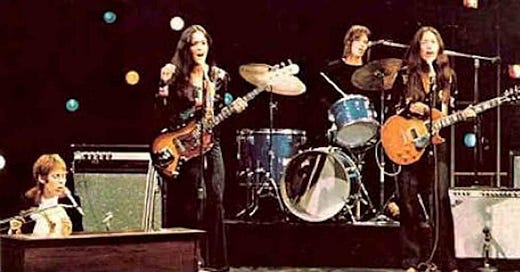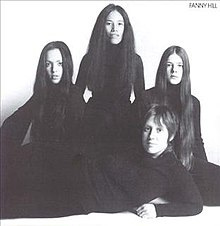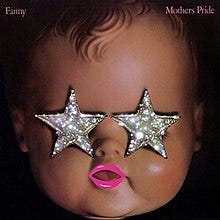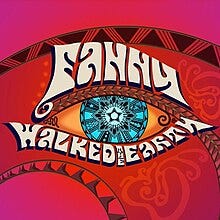"Last Night I Had a Dream" by Fanny (1973) with Todd Rundgren as producer
Todd Rundgren Creator Series
Today is the ninth post in our series about music legend Todd Rundgren, continuing to cover his career as a producer.
We’ve already reviewed his early years, up to and including The Nazz.
We’ve talked about his pop hits — “We Gotta Get You a Woman” (here), “Hello It’s Me,” (here), and “I Saw the Light” (here).
We’ve covered his first major gig as a producer, The Band’s Stage Fright album (here), as well as a record that appeared to cement Todd’s reputation as a hit-maker, We’re an American Band by Grand Funk (Railroad) (here).
We’ve also talked about Badfinger’s hit singles off their Straight Up album, “Baby Blue” produced by Todd (here), and “Day After Day,” produced initially by George Harrison and finished by Todd (here).
Today we cover the first all-female rock group to release an album on a major label, whose fourth album was produced by Todd Rundgren. That group is Fanny.
Song of the day
The rock group Fanny was formed in 1969 by two sisters, June and Jean Millington, who as kids had moved to Sacramento, California from the Philippines and formed a band called the Svelts in high school. They later ended up joining Wild Honey, started by former members of Svelt, and were discovered at open mic night at the Troubadour Club in Los Angeles by producer Richard Perry, who got the group signed to Reprise Records (Warner Brothers).
Fanny had a Top 40 hit with the title track from their album Charity Ball, and their cover of Cream’s “Badge” got significant radio play. Their cover of Marvin Gaye’s “Ain’t That Peculiar” from their third album, Fanny Hill (1972), reached #85 on the Billboard Hot 100, and the album itself, recorded at Apple Records with the Beatles’ recording engineer, Geoff Emerick, rose to #135 on the Billboard 200 chart. The song “Butter Boy” on their fifth and final album, Rock and Roll Survivors (1974), went to #29 on the Billboard Hot 100 and was one of Casablanca Records’ first Top 40 hits.
They toured the world, opening for such bands as Jethro Tull, Humble Pie, the Kinks, Steely Dan, Deep Purple, and Slade, and appeared live on The Sonny and Cher Show, The Kenny Rogers Show, American Bandstand, The Old Grey Whistle Test, and Beat-Club, not to mention working as L.A. session musicians, including for hit-maker and Grammy and Oscar-winning singer, songwriter, actress, and director Barbra Streisand.
Dubbed the Queens of Rock and Roll by the music press, the band lived together in film actress Hedy Lamarr’s old home in Los Angeles, called Fanny Hill, and jammed in their basement with a who’s who of the rock world, including The Band, Little Feat, Joe Cocker, Bonnie Raitt, and Mick Jagger.
Fanny kicked you-know-what, but don’t take my word for it. In an interview in Rolling Stone in 1999, David Bowie called them “one of the finest fucking rock bands of their time, in about 1973. They were extraordinary: they wrote everything, they played like motherfuckers, they were just colossal and wonderful, and nobody’s ever mentioned them. They’re as important as anybody else who’s ever been, ever; it just wasn’t their time.”
Todd Rundgren produced their fourth album, Mothers Pride, in late 1972 and early 1973. According to keyboardist Nickey Barclay, “The only person that the four of us could agree on to produce us — that was available to produce us — was Todd, and he was into it. We'd done a few gigs with him, and he liked the idea.” They recorded most of the album at Todd’s studio, Secret Sound, in New York City. Todd has said that recording them was just like every other act, except for having to keep the curious out of the studio when sessions were going on. (Maybe also because one of them was too hot in the studio and went topless during the recording.)
Although it didn’t chart any hits, the album received positive reviews, especially for Todd’s emphasizing of song structure and harmonies, with New Musical Express calling it “truly excellent.”
As we’ll see in tomorrow’s post, Todd would often take on acts that everyone else turned down, either seeing possibilities that they didn’t see or believing that he could deliver both artistically interesting and commercially profitable records. And as we’ll see in the post after that, he was a consistent supporter of women who rocked.
Here’s Fanny singing one of their songs from Mothers Pride, “Last Night I Had a Dream,” a Randy Newman cover (from his Sail Away album), on The Midnight Special:
So what happened to Fanny? Why did they break up right before “Butter Boy” became a hit? Some posit that they were ahead of the social moment as an all-female rock band with some Asian-American and lesbian members. But the fact that they had been accepted into the rock and roll community, including by Bowie and Jagger, appeared on many popular TV shows featuring musical acts, fronted for top rock acts, and charted Top 40 hits and critically well-reviewed albums belies this explanation.
Perhaps Bowie lead guitarist Earl Slick, who married Fanny bassist Jean Millington, has put his finger on the real reason, the same reason that other rock bands, particularly in this era, fell apart. He points to shyster lawyers, managers, and other people doing wrong by bands in what he characterizes as “a pretty nasty business,” a business in which “some people can get through that in one piece; most don’t.”
Fanny would break up because, although they were engaged in nonstop touring and recording, they were seeing no money except for basic touring expenses, not even a salary, and were now being pressured by the label to work even harder and produce a top hit. They found that, quite simply, they had been working their fannies off and were exhausted from constant touring, but were seeing no reward to make it all worthwhile. One doesn’t have to look far — namely Joe Cocker or members of Chicago — to find that having a monster album or a string of hit singles was no guarantee of financial security, or even of enough money to buy a house. Add marriage or children into that picture, and the rock and roll lifestyle could become impossible to sustain, especially for women.
The good news is that Fanny’s influence would live on in bands to follow, such as Heart, the Go-Go's, the Bangles, the Runaways, and the B-52s. According to lead vocalist Cherie Currie of the Runaways, “They cracked that door and made it possible for us to believe that we could do it too.” Members of Fanny would also, individually, go on to make their marks in other ways in the music industry, producing and promoting other acts (e.g., Holly Near), performing as session and touring musicians (e.g., with ELO), and fronting other bands (American Girls and Boxing Gandhis).
Three of the original group members also reunited under the name Fanny Walked the Earth and put out new music in 2018. The recording process and the history of the band were covered in a 2021 documentary called Fanny: The Right to Rock, currently available to rent on several streaming services (e.g., hoopla, PBS, amazon prime, Apple).
Album and song credits
Songwriter - Randy Newman
Fanny:
June Millington – guitar, acoustic guitar, lead and backing vocals
Jean Millington – bass, lead and backing vocals
Nickey Barclay – piano, organ, keyboards, acoustic guitar, lead and backing vocals
Alice de Buhr – drums, percussion, lead and backing vocals
Technical personnel:
Todd Rundgren – producer, engineer, mixing
Glyn Johns – engineer
Andy Johns – engineer








Another factor of their obscurity was the clear sexual implications of their name, obviously chosen for shock value. That may have contributed to Reprise dropping them and then Casablanca picking them up again.
Yes! Love Fanny and was thrilled to get to see them last year at an Asian Pacific Islander Arts Festival in San Francisco. They never got the notice and recognition they deserved. So glad they are back!
I wrote about the experience in the post linked below.
https://earworm.substack.com/p/recowmendations-may-2023-women-who?utm_source=publication-search